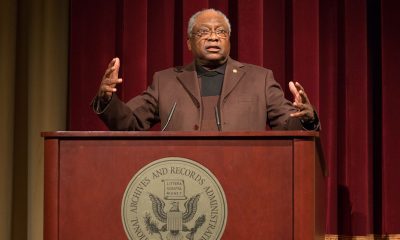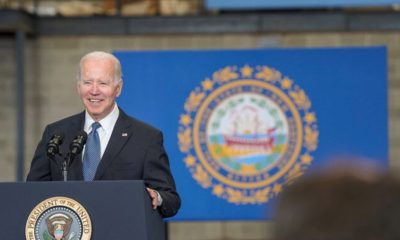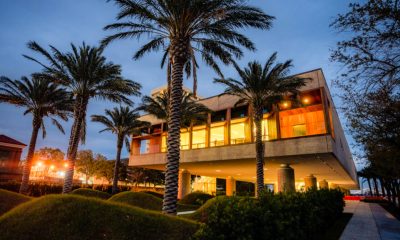Religion
The Black Church and the Strength to Forgive

Emanuel AME Church stands in the background as a mourner visits a sidewalk memorial in memory of the shooting victims Saturday, June 20, 2015, in Charleston, S.C. (AP Photo/David Goldman)
By Jazelle Hunt
Washington Correspondent
WASHINGTON (NNPA) – For many outside the Black community, they had never seen anything like it. Though suffering and deep in pain from the loss of loved ones at the hands of Dylann Roof at Emanuel A.M.E. Church in Charleston, S.C., they reflected the finest reflection of Christian values.
A daughter Ethel Lance, 70, one of the nine killed at Bible study, struggled to find the right words.
“I will never be able to hold her again. But I forgive you and have mercy on your soul,” she said, her voice trembling with emotion. “It hurts me, it hurts a lot of people, but God forgive you and I forgive you.”
Speaking for her family, a sister of Rev. DePayne Middleton-Doctor, 49, had a similar message.
“We have no room for hate,” she said softly. “We have to forgive. I pray God on your soul. And I also thank God that I won’t be around when your judgment day comes with him.”
One-by-one, they took turns, sharing their grief, but not any rancor. How could they be so forgiving?
In order to understand the answer to that question, experts on religion say, you have to understand the role the church plays in Black America and how the nation’s most religious group – African Americans – take the teachings of Jesus’ literally.
“To understand the Black Christian tradition and faith that has nurtured Black people for centuries is to know that they live by a deep, resilient faith that God is on the side of justice, God is on the side of love,” explained Rev. Forrest Harris, president of American Baptist College in Nashville, Tenn. and a scholar on the Black Christian church. “And that ultimately, though people will tragically experience what we saw happen at Mother Emanuel, ultimately love will prevail and hope will prevail.”
Rev. Susan K. Smith of Columbus, Ohio says that Scripture shows that it’s reasonable to feel and wrestle with difficult emotions, instead of jumping straight to forgiveness.
“If you don’t deal with your real, strong feelings, it’s almost impossible to get to a place where you can forgive,” she said. Smith points to Psalm 13, saying, “The Psalmist, who expresses his pain…then at the end of the Psalm there’s a ‘but, I will praise you anyway.’ This is vital, because what we have with God is a relationship, and in relationships there are always times when you don’t get it.”
Rev. Amos Brown, pastor of the Third Baptist Church of San Francisco and NAACP national board member, said Blacks should not bear the brunt of suffering – or forgiveness – in the U.S.
“I do not feel in my spirit that Blacks should have to be the sacrificial lambs all the time,” he explained. “The pain is so great and it’s insulting that America has still not confessed to its wrong and its evil. And that evil is racism.”
Relatives of the nine slain in Charleston refused to be overcome by the evil of racism.
“In this particular context, we’re all deeply moved by the family offering up forgiveness, and I want to honor that supernatural manifestation of grace,” says Pastor Michael McBride, leader of The Way Christian Center in Berkeley, Calif., and director of the PICO Network Live Free Campaign, which uses faith to fight mass-criminalization.
“The process of forgiveness first has to acknowledge the offense…the gravity of the offense…the pain that’s been caused. Then it requires an analysis made in very clear terms the kinds of grievances that have been done, so as to not allow those grievances to continue to be perpetrated.”
According to a 2009 Pew Research Center report, nearly 80 percent of Black people say religion is very important in their lives, with 53 percent attending church every week (compared to 39 percent of the overall population). Church is especially important to Black women who are unrivaled in their dedication to their faith (84 percent say they are) and attend church each week (nearly 60 percent do).
Pastor Jonathan Newton, executive minister at Metropolitan A.M.E. Church in Washington, D.C., points out that the lesson of forgiveness is not only God’s way, but also served Black Christians well during the Civil Rights Movement by lending moral weight to the cause.
On the other hand, Pastor Newton explains that forgiveness is not necessarily passive.
Like Mother Emanuel, Metropolitan A.M.E. was founded in the early 1800s and has a storied legacy within the course of Black history. On Friday, hundreds gathered to pray for its sister church in Charleston – later, the church received a bomb threat in return. The previous day, a few other A.M.E. churches in South Carolina were threatened as well.
“[After the shooting] one of our A.M.E. bishops sent around to the churches a litany to explain that the church doors will remain open; we will continue to do what God calls us to do. But while we forgive, we still step up security,” he says.
“Our [A.M.E.] tradition starts with the concept of social justice. The disparate treatment of people is not to be quietly tolerated. That we forgive doesn’t mean we forget, it just means we release the hold that bitterness and hatred has on us.”
The A.M.E. church is indeed grounded in resistance. Free Blacks in Philadelphia founded the denomination in the late 1700s when White Methodist Episcopalians refused to pray along side them and used force to interrupt their worship. The Black parishioners began their own church and successfully sued for the right to be an independent congregation. O
This is not the first time a White supremacist had targeted a Black church.
According to one study, there were more than 300 racially-motivated church bombings or burnings in the 1960s, and an additional 200 between 1989 and 1996. In 2008, two White men were convicted of burning down a COGIC church in Springfield, Mass. in reaction to President Barack Obama’s election.
Pastor Newton and others maintain that emulating Christ’s example of love does not conflict with seeking justice and true reconciliation.
“This sounds trite, but the first thing is prayer. We believe that prayer changes things, but also prayer brings calm, reasonable, rational thinking.”
“[Then] we deal with it, and not try to suppress…we talk about the anger, the hurt. Our faith is what makes us strong through using political actions and our educations …in our strides to social justice.”
#NNPA BlackPress
COMMENTARY: Prayer is Your Power
Terrible things happen to good people often. We live in an unjust world with people making decisions that are informed more by profit than people. We cannot take those principles into our relationship with God. We must believe that “… all things work together for good to them that love God, to them who are the called according to His purpose.”
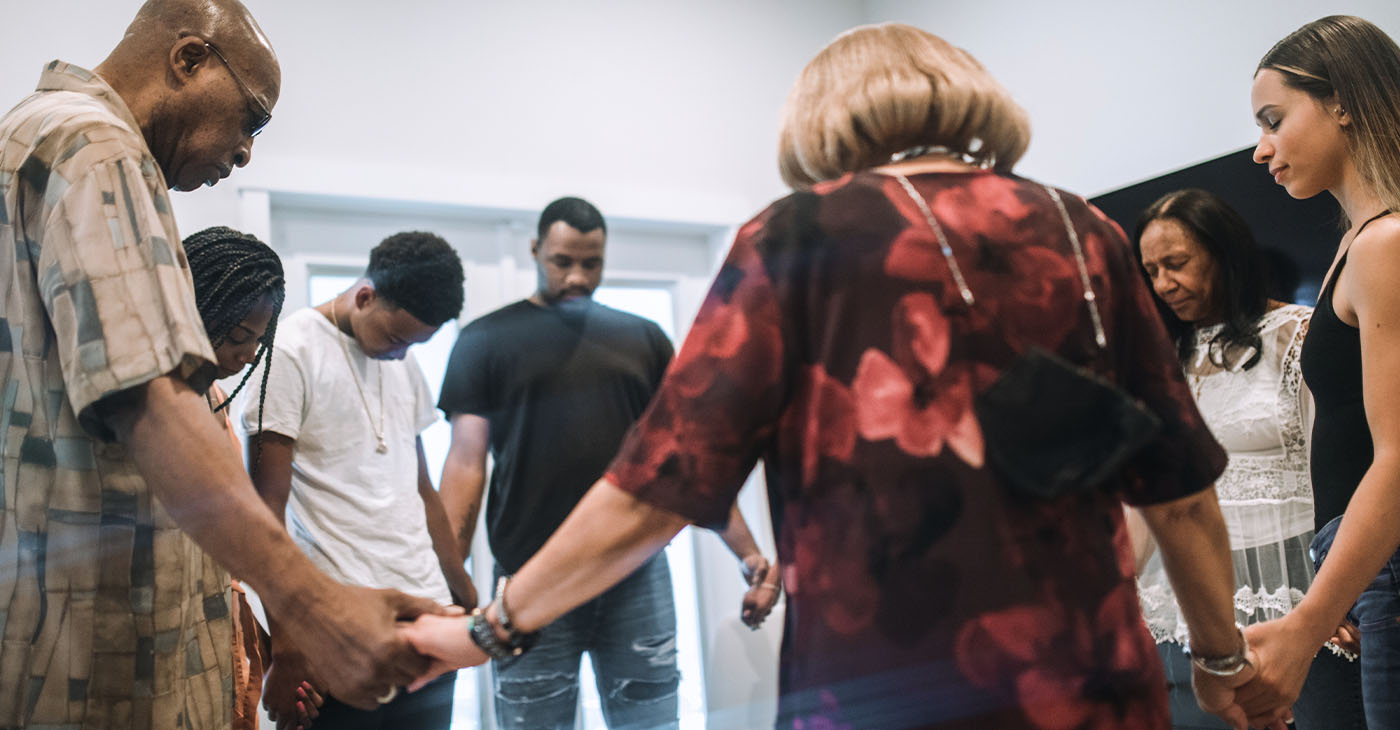
Faithful Utterances
By Dr. Froswa Booker-Drew | Texas Metro News
This week, a friend informed me that she was following the ambulance to the hospital with her husband. Her husband was going through a major health crisis. She wasn’t the only one who reached out—a friend’s mother had unexplained pain and another friend contacted me about her friend’s son who was hospitalized with pneumonia. Each of them asked that I pray for them.
I consider it an honor to pray for others. Prayer is powerful and I love that I have a group of friends who I can turn to that I call the “prayer warriors” that when I send a text to lift up the concerns and issues of others before God, they go into battle mode.
Prayer is a weapon and I think many of us don’t understand its power until we need it. For many of us, it’s a routine, something that’s more about religion than it is about relationship. We have gotten prayer twisted as some exchange solely for stuff. God is not a celestial Santa Claus dropping off gifts. Prayer is an opportunity to go before to God sincerely in relationship. “And when you pray, you must not be like the hypocrites. For they love to stand and pray in the synagogues and at the street corners, that they may be seen by others.
Truly, I say to you, they have received their reward. But when you pray, go into your room and shut the door and pray to your Father who is in secret. And your Father who sees in secret will reward you. And when you pray, do not heap up empty phrases as the Gentiles do, for they think that they will be heard for their many words. Do not be like them, for your Father knows what you need before you ask Him.” (Matthew 6:5–8)
Prayer is about faith. It is believing that God hears us. “Let us then with confidence draw near to the throne of grace, that we may receive mercy and find grace to help in time of need.” (Hebrews 4:16) I realize that my prayers are even more powerful when I am in relationship with others seeking God: “For where two or three are gathered in my name, I am there among them” (Matthew 18:20). It’s dangerous when we see prayer as a way to manipulate God into doing what we want. There is nothing wrong with bringing your requests before God but it’s important to check our motivation and intention. It’s also important to know that just because God doesn’t answer our prayers in the way that we want does not mean that God doesn’t love us.
It doesn’t mean that God does not hear us. It does not negate the omnipotence or goodness of God, either. We must believe that God is able. “And without faith it is impossible to please God, because anyone who comes to him must believe that He exists and that He rewards those who earnestly seek him.” (Hebrews 11:6) It’s easy to blame God when things don’t go the way we want them to—”the rain falls on the just and the unjust” (Matthew 5:45).
Terrible things happen to good people often. We live in an unjust world with people making decisions that are informed more by profit than people. We cannot take those principles into our relationship with God. We must believe that “… all things work together for good to them that love God, to them who are the called according to His purpose.” (Romans 8:28) …. God is concerned with our hearts, with people and cares for us even when things don’t go the way we’d like. I can report that all of the individuals we prayed for had excellent results.
God is good! Yet, I realize that this isn’t always the case. Prayer is powerful. God wants us to have this daily form of communication. 1 John 5:14, tells us: “And this is the boldness we have in Him, that if we ask anything according to His will, He hears us.” Don’t use prayer just when you need something. Just as all relationships require consistent communication for growth and results, the same is even more important in our relationship with God. Prayer is a powerful partnership with God that can move mountains when we believe!
Dr. Froswa’ Booker-Drew is the host of the Tapestry Podcast and the author of three books for women. She is also the Vice President of Community Affairs for the State Fair of Texas. To learn more, visit drfroswa.com.
Black History
AFRICAN-ISH: The First Christmas Story
Both Joseph and Mary were of the lineage of David, Joseph descended from David’s son Solomon (and Bathsheba), and Mary extended from another son Nathan. Therefore, they were required to go to the little town of Bethlehem, in Judea and there, in a cattle shed Jesus was born. (Bethlehem is 70 miles south of Nazareth and 5 miles southwest of Jerusalem).

By Simon Burris
The narrative of Jesus’ birth and proof of his Hamitic (Black) African bloodline* began in the Old Testament in the book of Genesis chapter 10, in the Land of Ham, located in southwest Asia and Africa. Three most prominent Hamitic personalities: Abraham, Isaiah and David.
People and places of Hamitic origins are underlined.
(1) Abraham the patriarch was Babylonian (Ethnic Ethiopian). Gen. 11:31; (2) Isaiah a prophet lived 750 years before Christ, predicted the virgin birth was a nephew of Amaziah a Judahite (Canaanite) king; and (3) David the great king of Israel was a descendant of Abraham, also of Tamar and Rahab (Canaanites).
The (Hamitic) Genealogy of Jesus Christ: Matthew 1:1-17; Luke 3:23-34
The Birth of Jesus: (about 6-4 BC)
Mary the virgin mother of Jesus and her husband Joseph the “foster” father of Jesus, a carpenter, lived in Nazareth, a town in northern Palestine.
At this time Emperor Augustus of the Roman Empire decreed that a census would be taken. Everyone in his domain had to go to his or her hometown to register. He probably ordered Cyrenius ( Quirinius ) the Afro Roman governor of Syria / Judeadistrict to take charge and supervise the mandate.
Both Joseph and Mary were of the lineage of David, Joseph descended from David’s son Solomon (and Bathsheba), and Mary extended from another son Nathan. Therefore, they were required to go to the little town of Bethlehem, in Judea and there, in a cattle shed Jesus was born. (Bethlehem is 70 miles south of Nazareth and 5 miles southwest of Jerusalem).
A short time later shepherds from the countryside as well as Wise Men (Magi) from neighboring countries Arabia, Babylonia,and Persia traveled to the nativity site, paid homage and worshiped the infant-Savior.
Now Joseph was warned by the Lord in a dream that Herod the Edomite king of Judea was plotting the murder of the child, fled with his family to Egypt, returning to Nazareth after the death of Herod.
Jesus had siblings, brothers Joseph, Simon, Epistle writers James, Jude, and several sisters. The last mention of Joseph occurs in the Gospel of Luke when he and Mary take the 12-year-old Jesus to Jerusalem. Mary played a vital role all through Jesus’ life, from the day He was born till the time of the crucifixion.
Conclusion: The four Gospels: Matthew, Mark, Luke and John chronicled the full theme of Christ as the universal Savior. *Descendants of Ham’s sons Cush (Ethiopia), Mizraim (Egypt), Put (Libya) and Canaan (Ancient Palestine/Israel). Genesis 10: 6-20
Footnotes: Why is Christmas celebrated on December 25?
The ancient Romans celebrated the winter solstice on December 25 as the birthday of the SUN; the Babylonians and Persians -SON of the SUN. Some 300 plus years after Jesus’ earthly demise, Roman Emperor Constantine in 336 legalized this date as the birthday of the SON of GOD – JESUS the CHRIST! Originally: Christ’s Mass.
Eurocentric racism: Pope Julius II in 1508 commissioned Michelangelo, Raphael and other Renaissance artists and church scholars to portray and depict almost all major biblical characters as Europeans (Caucasians), save servants and slaves.
Activism
SDA Churches Join Outreach Efforts to Find Solutions to Upsurge of Violence
the Northern California Conference of Seventh Day Adventists (SDA) held their annual Convocation at Grand Avenue Seventh Day Adventist Church in Oakland. Seven hundred people came together in celebration and worship. The theme was “Embracing Change.”
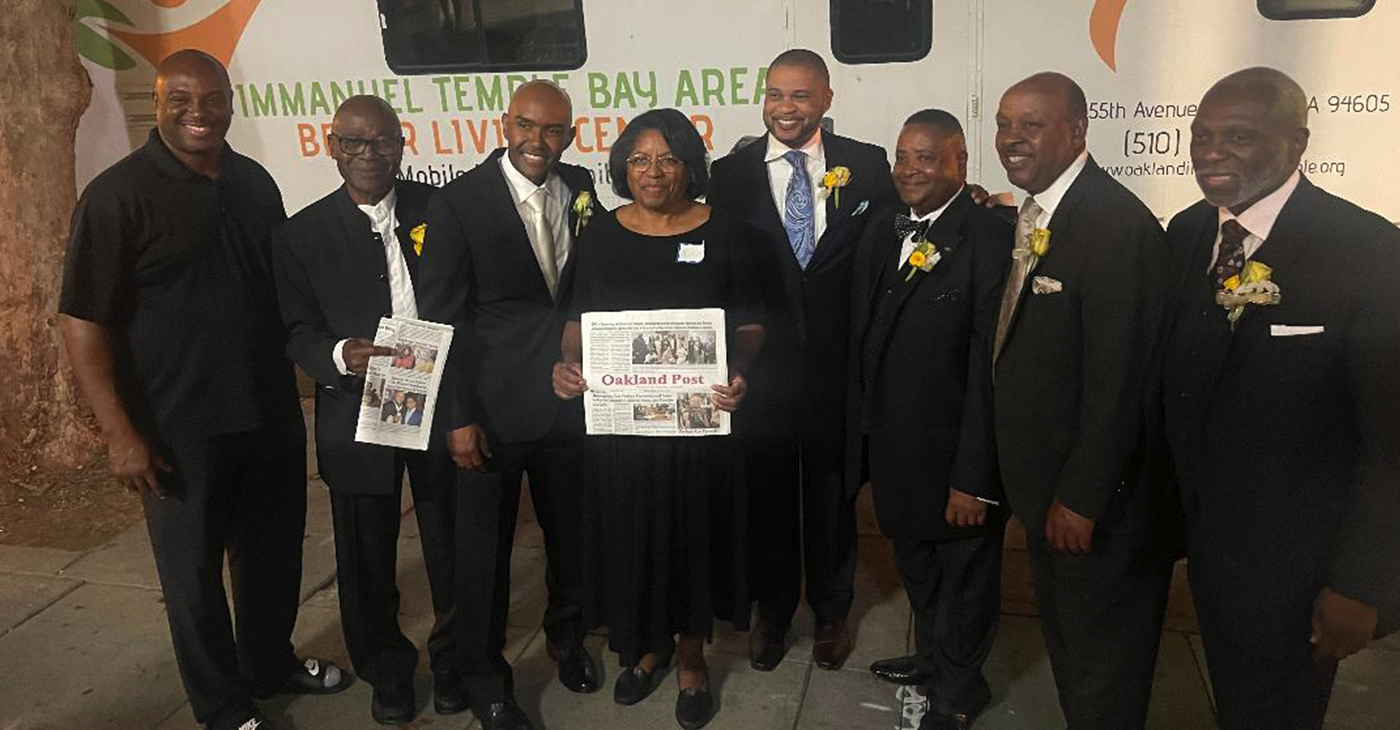
By Post Staff
On Oct. 8, the Northern California Conference of Seventh Day Adventists (SDA) held their annual Convocation at Grand Avenue Seventh Day Adventist Church in Oakland. Seven hundred people came together in celebration and worship. The theme was “Embracing Change.” The guest speaker was Dr. Myron Edmonds, who pastors in Cleveland, Ohio. He spoke about how Christ wasn’t a traditionalist, and the work isn’t being done because some in the church don’t wish to change and they tend to demonize new ideas.
Throughout the day, the Mobile Medical Health Van operated by Immanuel Temple Seventh Day Adventist Church out of Oakland sat in front of the church and provided health screenings and community resource information to the general public. The Medical Van, which was gifted to the church by Pastor Raymond Lankford of Healthy Communities, has provided free health care services throughout Alameda County for the last few years. The prayer of Pastor Damon Washington of Immanuel Temple Church, who was ordained during the afternoon program, is for their health ministry to partner with the other providers like OPIC and Oakland Workforce Agencies and to combat the ongoing health disparities and violence within the city and beyond.
They have pledged to work with the Chaplains, the OPIC and the Formerly Incarcerated Giving Back, who want to make amends for the damages they have done to harm Oakland.
-

 Activism4 weeks ago
Activism4 weeks agoOakland Post: Week of March 20 – 26, 2024
-

 #NNPA BlackPress3 weeks ago
#NNPA BlackPress3 weeks agoCOMMENTARY: D.C. Crime Bill Fails to Address Root Causes of Violence and Incarceration
-

 #NNPA BlackPress3 weeks ago
#NNPA BlackPress3 weeks agoMayor, City Council President React to May 31 Closing of Birmingham-Southern College
-

 #NNPA BlackPress3 weeks ago
#NNPA BlackPress3 weeks agoCOMMENTARY: Lady Day and The Lights!
-

 #NNPA BlackPress3 weeks ago
#NNPA BlackPress3 weeks agoFrom Raids to Revelations: The Dark Turn in Sean ‘Diddy’ Combs’ Saga
-

 #NNPA BlackPress3 weeks ago
#NNPA BlackPress3 weeks agoBaltimore Key Bridge Catastrophe: A City’s Heartbreak and a Nation’s Alarm
-

 #NNPA BlackPress3 weeks ago
#NNPA BlackPress3 weeks agoBaltimore’s Key Bridge Struck by Ship, Collapses into Water
-

 Activism3 weeks ago
Activism3 weeks agoOakland Post: Week of March 27 – April 2, 2024





